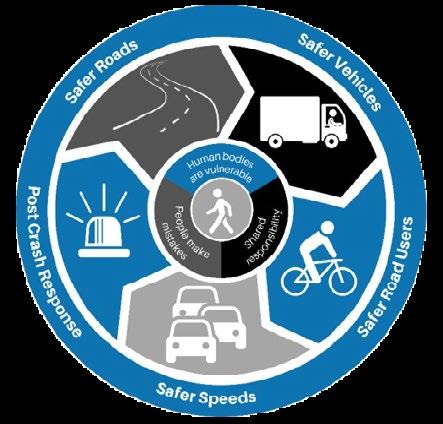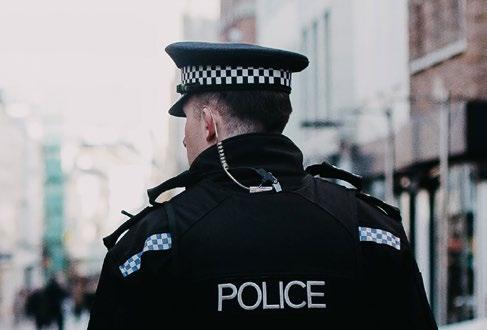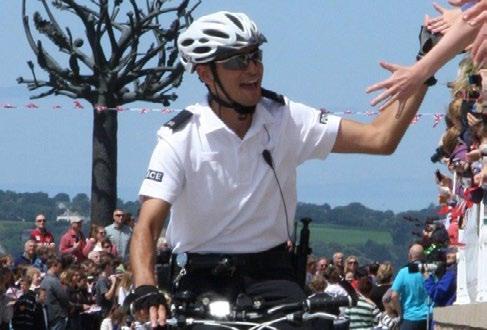




States of Jersey Prepared

The publication of the Annual Report provides a welcome opportunity to reflect on the contribution made by States of Jersey Police to the safety of our community.
Given that comparisons between 2022 and the preceding two years are complicated by the profound impact of the Covid pandemic and associated lockdowns on crime and policing activity, this Report takes the opportunity to look back over a longer period. As such, it offers an insight into how community safety in Jersey is changing over time - a perspective that can easily be lost through a narrower focus on fluctuations from one year to the next.
These longer-term comparisons show a picture of growing public confidence in the safety of our community, borne out by significant reductions in a range of crime types. At the same time, they also highlight how new challenges are coming to the fore. Central to these emerging trends is the protection of people who are at risk or vulnerable, and we are committed to playing our part in driving sustainable change that embeds community safety even deeper into Jersey’s way of life.
In early December, our community suffered two tragedies in the space of two days with the sinking of the trawler L’Ecume II and the explosion that destroyed a block of flats at Haut du Mont, to which 13 Islander's tragically lost there lives. Ongoing investigations are complex. When terrible events
 ROBIN SMITH, CHIEF OFFICER, STATES OF JERSEY POLICE
ROBIN SMITH, CHIEF OFFICER, STATES OF JERSEY POLICE

occur, people look to the emergency services to inspire confidence.
At the same time, they also expect undiminished levels of service in the day-to-day policing of the Island. Despite the severe pressure on our organisational resilience, I'm enormously proud of my officers and staff's response both then and now. I hope and believe that we delivered on both counts.
“The world of policing and community safety is always changing and, as an organisation, we constantly seek out the best ways to respond and adapt to new challenges.”ROBIN SMITH, CHIEF OFFICER, STATES OF JERSEY POLICE
The world of policing and community safety is always changing and, as an organisation, we constantly seek out the best ways to respond and adapt to new challenges. But at its heart, policing is about good people coming to work every day to help keep their community safe. This is my opportunity to publicly thank my officers and staff, and colleagues from our partner agencies, for their commitment to this goal. Low levels of crime and high levels of public confidence in community safety - key to making our Island such a great place to live - are proof of the difference you make.
“Low levels of crime and high levels of public confidence in community safety - key to making our Island such a great place to live - are proof of the difference you make."
ROBIN SMITH, CHIEF OFFICER, STATES OF JERSEY POLICE
Following on from the 4 year policing plan published last year, the policing priorities for 2021 were updated and refreshed as is pictured here.


In delivering our Policing Plan, we will ensure that Jersey remains a safe place to live and crime stays low We commit to support and safeguard vulnerable people within our community as well as victims of crime We want people to continue to have trust and confidence in our policing, and in doing so, we will ensure that our Police service is modern, appropriately resourced, well led and continuously improving
Jersey remains safe and crime is low
With Partners
develop an island wide Violence Against Women
& Girls
Victims of crime and vulnerable people are safeguarded and supported
People have trust and confidence in our police
The States of Jersey Police and staff are well led and constantly improving
The States of Jersey Police is appropriately resourced to ensure it has a resilient workforce
Reduce mental health demand on police
Develop and deliver a new
Develop specialist problem solving skills and initiatives in our community to
reduce and prevent
crime
and anti social
behaviour
Support the rebalancing of government finances by continuing to maximise efficiencies
Continue to prioritise our organisation's health and well-being by delivering our well-being strategy
) Strategy
(VAWG
and deliver a
sexual assault action
plan
with the LOD
Enhance the Financial Intelligence Unit
including its contribution
for the 2023 Moneyval review
Continue to work with Government through phases of Covid recovery
We will focus on preventing crime and harm by continuing to work in partnerships
roads policing strategy
in
stakeholders
partnership with key
Continue to deliver the Victims Charter for Jersey
Deliver
the recommendations
of the 2021 Counter
Corruption review
Embed
the new
legislation and
change programme
of the Police Complaints Law

Continue to increase the diversity of the States of Jersey Police to better represent the community it serves
Continue to drive efficiencies, in particular through digital transformation opportunities
Stabilise,
enhance and develop
the new
Deliver
the recommendations
of the 2021
Digital Forensic Review
We will see an increase in victims supporting criminal complaints and an increase in domestic abuse victims feeling safeguarded by the police We will reduce the number of repeat victims and offenders, and reduce the number of children exposed to domestic abuse
We will monitor any change in the cost of policing per 1,000 population
We will ensure our resident population continue to feel safe in their communities
We will continue to meet our response targets to requests for assistance and we will continue to catch criminals
We will continue to ensure that States of Jersey Police target the issues that matter most to Islanders
We will monitor any change in the number of police officers and staff per 1,000 population
2021 Police
Staff Structure
Embed and deliver
the 2021 Workforce Plan and
the Equality, Diversity
and Inclusion Strategy
We will see an increase of our workforce who describe SOJP as a good place to work
We will see an increase of officers and staff who consider themselves competent to undertake their duties

In 2022, 3,015 crimes were recorded in Jersey. Except for 2020, which was affected by Covid lockdowns, this is the lowest level of recorded crimes since 2016 and represents just 29.2 crimes per 1,000 population. By comparison, the recorded crime rate across Force areas in England and Wales ranges between 58 and 143 per 1,000 population.
Much of the Island sees very little crime. Across seven of the 12 parishes, just 233 crimes were recorded in 2022 – less than 8% of the total. As in previous years, about 58% of crime was recorded in St Helier.
This is to be expected given that the town is home to a third of the population and the hub of Jersey’s busy night-time economy.
Offences against the person, which includes assaults, sexual crimes, harassment, child cruelty and neglect, accounted for about half of all Jersey’s crime in 2022.
974 of these offences were either grave and criminal (173) or common assaults (801). These assaults are up 14% up on 2021 but still 4% down on 2019 (pre-Covid restrictions). Domestic abuse and night-time violence in the streets, pubs and clubs of St Helier remain key drivers, accounting for over half of the assaults.
Crime in 2022 at a glance 1/3
OF ALL CRIMES WERE ASSAULTS
1 in 5 OF ALL ASSAULTS TOOK PLACE IN THE ST HELIER NIGHT TIME ECONOMY
29% OF ALL ASSAULTS WERE DOMESTIC RELATED
14% SERIOUS VIOLENCE DOWN 14% ON 3 YEARS PREVIOUS
81
DOMESTIC BURGLARIES.
17
BUSINESS BURGLARIES.
LOWEST NUMBER ON RECORD
52
RAPES OF WHICH 38% CLASSED AS DOMESTIC AND 31% HISTORIC
56
BURGLARIES INVOLVED ENTRY INTO DWELLINGS. A THIRD HAD BEEN LEFT INSECURE
129
OTHER SEXUAL OFFENCES, OF WHICH 21% WERE HISTORIC
219
MOST COMMON OFFENCE AGAINST PROPERTY WAS MALICIOUS DAMAGE TO VEHICLES
Recorded crime is an imperfect measure of community safety – not all crimes are reported to the police. So, since 2005, we’ve included questions in the Jersey Opinions and Lifestyle Survey (JOLS) to track public perceptions of neighbourhood safety.
Comparisons of these independent survey findings over time highlight growing public confidence in community safety. Overall perceptions of safety (very safe/fairly safe) have remained very high throughout, but real change can be seen in the proportion of Islanders who consider their neighbourhood to be very safe.
The improvement in perceptions of neighbourhood safety is also apparent in St Helier.
%
JOLS also shows how Islanders’ concern at becoming victims of key offences is reducing over time.
% of adults who were very/fairly worried about becoming victims of these particular crimes in the next 12 months
The overall number of crimes recorded in Jersey has fallen from 3,831 in 2012 to 3,015 in 2022 – a reduction of 21%. Some offence types have shown change that is even more significant.
Comparing recorded crime for 2022 to 2012 shows just 98 burglaries against 297 in 2012 and a 27% fall in malicious damage offences from 750 to 547. Malicious damage to vehicles is down 42%, whilst the number of vehicles stolen (taken and driven away) has reduced by 55%.
Public perceptions of community safety are improving over time. So how have crime levels changed in the last decade?
Whilst the correlation between these trends suggest Jersey is becoming safer, it is important to note that not all crimes are created equal - some are far more harmful than others. Whilst overall acquisitive crime has fallen by 55% and offences against property by a quarter compared to 2012, offences against the person have risen by over 20% in that time.
Society is becoming far more conscious of crimes, such as violence against women and girls, that often remain behind closed doors.
More people are now coming forward to report such incidents. In the five years to 2012, for example, the Police investigated an average of 14 rapes a year. Last year, it was 52. By 2019, known physical and sexual assaults against females had increased by 50% compared to 2012.
Such assaults made up three-quarters of the 720 crimes defined as VAWG in 2022. Harassment, annoying or obscene calls, breakins and malicious damage accounted for another 12% of these offences. The majority of these VAWG offences (62% in 2022) are not linked to domestic abuse.
St Helier is the hub of Jersey’s night time economy (NTE), and thousands of people regularly enjoy its night life without any trouble. Nevertheless, there is inevitably potential for alcohol-related violence and disorder as large numbers of revellers spill onto the streets at peak periods.
SOJP help keep the peace and ensure public safety through high visibility patrols, positive public order policing and checks to support licensed premises and ensure compliance with the law.
When incidents occur, SOJP will respond quickly to prevent problems escalating and bring offenders to justice.
40%
213
1339
82%
39%
33%
Physical and sexual assaults against females 2012-22, taking into consideration a population increase too.
Levels of violence in St Helier’s night time economy had been slowly increasing year-on-year before the disruption caused by Covid in 2020-21. Last year saw a return to higher levels but the 212 violent offences remained below 2016-19 and still 26% down on a decade ago.1 Most of these violent crimes involve people who know each other.
1 Offences
A safe road environment requires road infrastructure that is fit for purpose, vehicles that are fit to be on the roads and drivers who are properly qualified, insured and obey the law.
States of Jersey Police and our Honorary Police partners contribute to the multi-agency effort required by -
● maintaining pro-active enforcement designed to deter and detect offences that put others at risk
● responding to incidents which result in injury, damage or disruption to traffic
● collating data on road traffic collisions to help identify possible road and junction design solutions.
2022 road safety response and enforcement policing
2,558 reported traffic incidentsfrom collisions to blocked roads
3,350 motorists given words of advice
DEFECTIVE VEHICLES IN ROADSIDE CHECKS
421 DRIVING LICENSE INFRINGEMENTS
232 MOTOR INSURANCE INFRINGEMENTS
To put current levels of drinkdriving in context, the 1980s saw up to 185 drink-drive road traffic collisions (RTCs) and 550 arrests per year. By 2012, there were just 55 drink-drive RTCs and 185 arrests.
RTCs plateaued at an average of 33 a year from 2015-18 but spiked to 47 in 2019. Covid restrictions saw numbers fall in 2020-21 but 2022 saw 36 crashes and 106 arrests. 61% of drunk in charge road traffic collisions (DIC* RTCS) involved drivers aged 20-35 compared to an average of 41% over the last decade.
Christmas drink-drive campaigns serve as a deterrent during the festive season when the temptation to drink drive is greatest. There were two DIC crashes in December 2022.

2,864 road traffic offences
660 SPEEDERS
611 MOBILE PHONES
260
After a promising three-year period to 2019, a downward trend in serious casualties plateaued before seeing a sharp increase in 2022. Two people were killed and 59 seriously injured in road traffic collisions with another 186 reported as slightly injured.
79% of the serious casualties were vulnerable road users such as motorcyclists, cyclists and pedestrians. This compares to just 50% across Great Britain. *Drunk In Charge
In December 2021, a government review of road safety proposed adopting the ‘Safe System Approach to Road Safety’ and targeting a 50% reduction in fatal and serious casualties by 2032. We will continue to play our full part in this cross-agency effort to make Jersey roads safer.

Targeting the importation and distribution of illegal drugs is key not only to preventing the harm they cause in our community but also in keeping organised crime groups from establishing themselves in our Island. 2022 saw continued efforts to disrupt or cut off existing and new sources of drugs supply into Jersey through intelligence-led policing operations. 41 different individuals were targeted resulting in drugs seizures worth about £377,000, together with a large amount of cash.
Jersey must always guard against potential terrorist threats to protect its own security and meet broader international responsibilities. Border security work is also important in identifying criminals moving in and out of the Island.
In the past, our Joint Financial Crimes Unit (JFCU) was primarily responsible for combating economic crime in Jersey, including fraud, money laundering and terrorist financing. 2022 saw the completion of significant restructuring of this function across three agencies.
The Economic Crime and Confiscation Unit (ECCU) was established within the Law Officers’ Department in 2017. Three police officers are seconded to the unit which focuses on significant economic crime risk to Jersey and prosecuting complex international financial crime and money laundering cases. ECCU results are now reported by the Law Officers Department.
The Jersey Financial Intelligence Unit (JFIU) was separated from the Police in 2022 to become an autonomous body, reporting to a board of Governors. The JFIU receives and analyses information on suspicious or unusual financial activity that could indicate money laundering or terrorist financingand disseminates this information to international partners. JFIU results are also now published separately.
The Jersey Financial Crime Unit remains an operational Police unit that investigates suspected financial crime, notably allegations of fraud, overseas corruption, bribery and tax evasion.
In 2022, the JFCU recovered £263,000 through its investigation, prevention and disruption work. About 60% of the recovered funds were from romance scams.
The 2021 census identified 5,285 children aged 13 to 17 living in Jersey. Whilst most of these children will not engage in any crime or anti-social behaviour, research shows that this is the age when people are most likely to start committing crime.
Many of those first caught offending as adults would have actually committed crime in their youth but not been caught. About one in 75 children in this age group are known to have become a firsttime offender in 2022, compared to less than one in 300 people aged 18–69.
This is a familiar pattern in Jersey and elsewhere. Most 13-17 year-olds will be law-abiding, some will commit a few offences before growing out of this boundary-testing phase, and a small hard core will become prolific offenders. Some then go on to become habitual criminals in adulthood.
The root causes of this pattern are complex and beyond the control of policing but it is the Police who must respond to the consequences. Much of the offending and anti-social behaviour may be low level but its cumulative impact is distressing for the communities who live with it. Meanwhile, a disproportionate amount of harm is caused by the small minority of prolific offenders.

Community policing is a key element of our strategy to address the broader challenge of youth offending. The Community Policing Team was enhanced in 2021 to an establishment of 16 officers, four who work directly with the Island’s schools and young people, and twelve in the parishes. Partnership working within local communities and with other agencies e.g. CYPES is at the heart of what they do. All are specially trained in problem-solving policing (PSP) and 2022 saw the introduction of new analytical tools to support their work.
By tackling emerging issues, they prevent crime and anti-social behaviour problems becoming entrenched, so helping contain overall crime numbers.
The proactive prevention work of the Community Team overlaps with targeted initiatives to tackle the hard core of prolific offenders, not only because of the crime they commit, but also because of their influence in drawing peers into more serious offending.
In 2022, the number of crimes known to have been committed by youths and the number of youth offenders were all down by nearly 30% compared to 2021.
The success of these initiatives is measured in the impact on youth crime and anti-social behaviour in 2022.
Where possible, it is preferable to divert children away from the formal court system. In Jersey, the Parish Hall Enquiry system provides a community-based justice alternative.
In 2022, 42% of youth offenders were dealt with solely at Parish Hall Enquiries, with another 7% being referred on to court. This compares to 28% of adults dealt with at Parish Hall, with another 16% being sent on to court.
How the ‘top 10’ most demand intensive young people affect police resources
Just looking at Police investigations, process offences and daily interaction like missing incidents, stop checks etc, the collective resource impact on the Police alone in 2022 was equivalent to 33 officers.
Involved in
1,600 incident logs
Reported missing
331 times
Arrested
80 times Offenders in
86 crimes
Suspects in a further
136 crimes Committed
54 process offences
Received
74 separate warnings
1,364 child subject of concern reports
69 court appearances
26 Parish Hall Enquiries
The overall detection rate for 2022, which includes all offences cleared up by the Police but not necessarily resulting in a criminal prosecution, was 28.5%. The ‘sanction detection rate’, where an alleged offender was charged or reported to a Parish Hall Enquiry, was 23%.
This section looks behind these headlines to offer a richer picture of investigation outcomes in Jersey and provide benchmarks with England and Wales performance.
A suspect was identified in nearly 70% of all completed crime investigations in Jersey in 2022, compared to about 51% in England and Wales. Not all these cases result in a sanction detection, however, depending largely on whether victims choose to pursue a complaint.
23%
Suspect identified; victim does not support further action
13%
Suspect identified; victim supports further action, insufficient evidence
8%
No suspect, victim does not support further action
22%

No suspect identified
3% Other
4% Administrative detection
10% Parish Hall Enquiry
3% Live investigation
14% Charged/TIC
This table compares outcomes in Jersey with national results, taking into account minor differences due to different criminal justice systems, notably the use of Parish Hall Enquiries in Jersey.
Prolific Offenders
618 INDIVIDUAL OFFENDERS WERE IDENTIFIED IN JERSEY IN 2022.
448 ARE KNOWN TO HAVE COMMITTED A SINGLE OFFENCE, ALTHOUGH ABOUT ONE IN FIVE OF THESE INDIVIDUALS WERE ALSO SUSPECTS IN OTHER CASES.
The impact of prolific offenders on community safety is highlighted by the remaining 170 individuals who committed multiple offences. Between them, they were responsible for 558 crimes – and 101 of them were also suspects for another 329 offences. Together, that represents nearly 30% of all recorded crime in 2022.
The key highlights are the higher proportion of crimes brought to justice in Jersey (23.4% compared to 9.2% in England and Wales), the much lower proportion of crimes where no suspect is identified (21.6% in Jersey, 38.5% in England and Wales) and the impact on detection rates, in both jurisdictions, of more than one in five victims choosing not to support further action against a suspect.

2,021 individuals were recorded as victims of crime in 2022, of whom 313 were victims more than once.
313repeat victims2022
15.5%
VICTIMS WERE REPEAT VICTIMS
Certain violent and high-harm crimes, such as domestic abuse and sexual violence, disproportionally affect women and girls.
Protecting all vulnerable people is one of the most important tasks we undertake - a priority that the Jersey Opinions and Lifestyle Survey shows is fully supported by the public.
Very high priority
High priority
Medium priority
Low priority
Don't know
The safeguarding role of the Police doesn’t just involve investigating crime or managing known offenders. Our officers also have a vital role in responding to situations where there is concern for people’s safety or welfare – we dealt with 3,276 such incidents last year.
Of the 417 domestic crimes recorded in 2022, 282 involved physical assault together with another 32 sexual offences, including 19 rapes. About 50% of all common or grave and criminal assaults on women in Jersey are committed by a spouse or former partner.
Repeat Domestic Victims 2022
14% Single repeat 7% Two-three repeats

The Police response to domestic abuse
1% Four-five repeats 1%
Six or more repeats
IN 4 DOMESTIC ABUSE
VICTIMS IN 2022 ARE KNOWN TO HAVE HAD PREVIOUSLY EXPERIENCED ABUSE OVER LAST DECADE
23% OF KNOWN DOMESTIC ABUSE VICTIMS WERE SUBJECT TO REPEAT OFFENCES IN 2022
76% One occurrence
There are four key elements to the policing of domestic abuse
VICTIMS ARE KNOWN TO HAVE EXPERIENCED DOMESTIC ABUSE ON 3 OR MORE OCCASIONS IN 2022
Respond to incidents, keep the victim and any other vulnerable people at the scene safe
● 1,084 domestic incidents
Assess victim’s risk and vulnerability at scene to help inform immediate and longer-term safeguarding action
● 27% assessed as high risk
● 32% medium risk
Investigate domestic abuse offences and support victims during the investigation
● 24% of all domestic abuse offenders brought to justice
● 49% of victims did not want to pursue a complaint.
Work with other organisations to safeguard victims and children
● 631 referrals to Jersey Domestic Abuse Support
● 58 referrals to Multi-Agency Risk Assessment Conferences (MARAC) - the established multi-agency process to develop safeguarding plans for the highest risk domestic abuse victims
● 284 notifications to Education so schools could support children who’d experienced domestic incidents
● 142 referrals to Jersey’s Multi-Agency Safeguarding Hub (MASH) set up to oversee safeguarding concerns for children
States of Jersey Police are a vital conduit to specialist services and partnerships established to try and safeguard victims against further abuse. In 2022, 50% of referrals to MARAC came from the Police. 63% of JDAS clients came from Police referrals compared to 18% self-referrals.
Six ‘Claire’s Law’ disclosures were made in 2022 to make victims or potential victims aware of a partner’s or ex-partner’s previous abusive or violent offending. 46 such disclosures have been made in the last five years.
With a significant proportion of victims being reluctant to pursue criminal proceedings, it is important to highlight the value of our close partnership with JDAS - an independent service that helps protect and support victims of domestic and sexual abuse. Referrals from the Police provide the majority of their clients.
In 2022:
366
VICTIMS AND SURVIVORS ENGAGED WITH JDAS
40%
OF CLIENTS EXPERIENCED NO ABUSE SINCE INTAKE
78%
OF CLIENTS EXPERIENCED REDUCED SEVERITY OF JEALOUS AND CONTROLLING BEHAVIOURS
86%
OF CLIENTS SAID THEY FELT SAFER WHEN LEAVING THE SERVICE
The key functions of the Police in safeguarding the public are -
● Investigate sexual offences
● Disruption of suspected perpetrators
● Referrals to specialist care support
● Referrals to safeguarding partners
181 sexual offences were recorded in 2022, including 42 historic offences. With a quarter of cases currently still under investigation, 15% of closed cases have seen an offender brought to justice but, in another 43%, the victim chose not to pursue a complaint.
The Jersey Multi-Agency Public Protection Arrangements (JMAPPA), was set up in 2011 to protect the public by coordinating the management of sexual, violent or dangerous offenders.
On 31 December 2022, there were 214 offenders under JMAPPA management in Jersey. 15 new sex offenders were convicted and registered with JMAPPA in 2022.
Registered Sex Offenders travelling to Jersey from the United Kingdom also require statutory management with the Police as the lead agency.
92%
OF CLIENTS WERE SUPPORTED WITH SAFETY AND 97% OF THOSE NOW HAVE A SAFETY PLAN
23% OF SEXUAL OFFENCES WERE AGAINST CHILDREN
CHILD SEXUAL ABUSE AND EXPLOITATION STRATEGY LAUNCHED JULY 2022
JULY 2022
1,512 mental health incidents were recorded in 2022, involving 635 different individuals. Demand has been increasing year-on-year and this represents a 138% increase in incidents compared to 2019. This is placing significant pressure on police response capacity, given that resolution of each incident can take several hours.
Work is ongoing with partners to address this problem by ensuring that appropriate mental health services are available when they are needed. New working arrangements contributed to a reduction in demand in the last quarter of 2022. Particular efforts also continue to reduce the need for police officers to detain people undergoing a mental health crisis in custody as a last resort. 25 people had to be placed in custody as a place of safety in 2022 - compared to an average of 51 in the five years before Covid.
When someone is reported missing, the police must assess the risk of harm and take appropriate steps to safeguard the person concerned.
In 2022, 759 missing person reports were received. Nearly two thirds of all of these reports were resolved within six hours and 85% within 12 hours. 95% of these reports involved children.
Behind these headline figures lies a significant problem. Between 2019 and 2021, missing children reports went up by 33%, although the number of children involved barely changed. The fact that 82 children were responsible for 720 reports in 2022 highlights how repeat absconding is a key driver. The reductions in 2022 are welcome but should not divert focus from the real issue.
In 2021, six children accounted for 342 incidents, 41% of the total. In 2022, six children again accounted for 328 incidents – 45% of the total. When children go missing, particularly on a regular basis, they are potentially vulnerable to criminal or sexual exploitation. Some are prolific offenders in their own right.
138% INCREASE
1,512 MENTAL HEALTH INCIDENTS WERE RECORDED IN 2022.
138% INCREASE IN INCIDENTS COMPARED TO 2019.
The police do everything in their powers to respond to this problem. At an estimated average policing cost of £1,186 per missing episode over the last two years, just these children alone represent nearly £800,000 in opportunity cost to the policing of Jersey. This does not include the costs associated with responding to and investigating the crime sprees associated with some of these individuals.
=41%
IN 2021, SIX CHILDREN ACCOUNTED FOR 342 INCIDENTS, 41% OF THE TOTAL.
=45%
IN 2022, SIX CHILDREN AGAIN ACCOUNTED FOR 328 INCIDENTS – 45% OF THE TOTAL.
£1,186
THE ESTIMATED AVERAGE POLICING COST PER MISSING EPISODE OVER THE LAST TWO YEARS.
Successful policing is not only about community safety outcomes but also about public trust and confidence in their police.

Findings from the independent Jersey Opinions and Lifestyle Survey indicate that public confidence in States of Jersey Police remains high despite policing in the UK facing significant reputational challenges. Both graphs exclude ‘don’t know’ responses to focus on respondents who expressed a definitive opinion. This eliminates the effect of significant variation in ‘don’t know’ responses from up to 15% in the earlier surveys to as low as 5% in 2016.
% of people who say States of Jersey Police do a good job of policing Jersey
% of people who say they are confident that the police would do a good job if they needed them
A key building block of public confidence is the expectation that the Police will respond quickly and effectively when people need their help, whether in relation to major incidents or a personal emergency. In JOLS surveys, about nine in ten people consistently say these should be key police priorities.
The Service dealt with 18,523 incidents in 2022, an average of nearly 51 a day. About one in 10 of these incidents required a Grade 1 emergency response.
Grade 1 Emergencies 2022
Target response time < 10 minutes
Average response time 8.5 minutes
Grade 2 Emergencies 2022
Target response time < 60 minutes
Average response time 37.2 minutes
When people need our help, they should expect a helpful, approachable and professional service. Our quality of service to victims is monitored independently by Victim Services who ask people for feedback once their case is completed. About 450 of their clients provided feedback in 2022.
The Police treated me fairly and with respect
I was kept regularly informed about the Police investigation
The Police investigation was progressed expeditiously
I received all the information I needed about the Police investigation
I was given advice on how to safeguard myself and access support
It was explained to me why the investigation was concluded and did not progress*
*(excluding 'not applicable' responses)
Victim surveys are regularly supplemented by the independent Jersey Opinions and Lifestyle Survey (JOLS), which goes to a random selection of households. About one in five JOLS respondents have typically had contact with our officers, so it reaches people who’ve encountered officers in many different circumstances.
% of JOLS 2022 respondents who agreed with the following statements
90% THE OFFICER WAS HELPFUL
93% THE OFFICER WAS POLITE
92% THE OFFICER LISTENED TO WHAT I HAD TO SAY
82% THE OFFICER WAS IMPARTIAL
77% THE OFFICER ACTED ON WHAT I TOLD HIM/HER
Findings from our victim surveys and JOLS are used to identify learning and improvement opportunities.
Society affords police officers considerable powers to stop and search, arrest and detain members of the public and, where necessary, use weapons or force in the course of their duties. Transparency and accountability about the use of these powers is key to ensuring public trust and confidence.
In 2022, officers made 2,843 stop checks, of which 495 led to voluntary searches, resulting in 41 arrests – 39 for drugs and two for possession of weapons.
In specified circumstances, officers also have the power to search a person or vehicle if they have reasonable grounds to suspect they will find stolen or prohibited articles. Officers made 82 such searches in 2022. Three vehicle searches also resulted in one arrest for going equipped.
On occasion, officers will deal with individuals who pose such a violent threat that force is necessary to protect the public, police officers or the aggressor themselves. The use of specialist Police equipment in these incidents is closely monitored.
CS spray was introduced in Jersey in 2002 but replaced in 2015 by PAVA spray, which is safer if Taser is also deployed. In 2022, officers had to draw their PAVA spray 36 times but only had to use it on 11 occasions.
Taser
Taser was first introduced in Jersey in 2014 for use by designated firearms officers only. In March 2022, the States of Jersey agreed to extend use to all post-probation officers who qualified to national training standards.
Taser deployment 2022
Taser drawn only Subject laser-dotted only Taser Fired
11 20 4
Officers had to deploy Taser on 35 occasions in 2022, but only had to use the weapon in four incidents, none of which involved ethnic minorities, females or under-18s. Given the small number of cases, no further detail can be provided publicly to protect the privacy of the individuals involved.
Firearms
Jersey Police have maintained a firearms team since 1972 to protect the public in spontaneous incidents and support planned security operations. Officers are trained to national standards and face rigorous continual assessment. The reduction in firearms deployments reflects the value of the ‘less-lethal’ tactical option provided by Taser.
Authorised Firearms Deployments 2019-22
2019
Custody
A key police responsibility is to ensure the lawful, safe and secure detention of prisoners in our custody.
Many are under the influence of alcohol or drugs, some will be violent and others are at risk of self harm.
915*
were arrested and placed in police custody a total of 1,304 times between them in 2022.
Better tactical options also enhance the safety of officers at risk. From 2012-16, an average of 48 officers were assaulted each year. In 2022, it was down to just 30.

Of the 824 adults, 82% were only in custody once in 2022. Just 7% were detained between three and a maximum of nine times.
By contrast, the figures highlight the problem of prolific offending amongst a small cohort of under18s. 60% of the 95 under-18s detained were only in custody once, but one in five were detained between three and a maximum of 19 times.
*4 individuals were detained both before and after turning 18 in 2022.


If the public are to have confidence in the police, they must also have trust in the police complaints system. The Jersey Police Complaints Authority (JPCA) is an independent body whose role is to ensure that every complaint is properly registered, recorded and comprehensively investigated and, where appropriate, referred to the JPCA for independent oversight and supervision.
Public complaints which cannot be resolved informally between the police and the complainant are referred to the JPCA. The Chief Officer may also refer any matter to the Police Complaints Authority if it appears that a member of the Force may have committed a criminal offence, or offence against discipline, that is not subject to a public complaint. Any deaths or serious injuries after contact with the police are also routinely investigated under the supervision of the JPCA to establish the facts surrounding the incident. The Police Complaints Authority also monitors the records of all complaints that are informally resolved by SOJP to ensure these cases are dealt with appropriately.
The JPCA’s annual report for 2022 (R.59/2023) is available on the States website. It shows that 64 complaints were registered with the police in 2022. 14 relating to SOJP were referred to the JPCA for supervision - 12 public complaints and two relating to cases of death or serious injury following police contact. The JPCA confirmed it had no cause for concern with any of the complaints informally resolved in 2022.
The JPCA was ‘pleased to report the number of complaints received by the police and those referred to the JPCA continue at relatively low levels’ and commented that ‘SOJP and honorary police officers provide a professional service to the public of Jersey and standards are generally very high’.
£17,917,050.5
LAST YEAR: £17, 526,695.7 (+2.23%)
£727,770.6
(+12.31%)
● Actual staff costs in 2022 were under budget due to staff vacancies in the Service
● Income over-achievement was due to recharges from DBS UK as well as other UK Forces under mutual aid arrangements
● Staff cost underspend expected due to the average time lag between resignations and recruitment during the year.
● Non-staff cost pressures are expected on firearms training and equipment, fleet management and electricity charges as well as software licences.
● Overspend on non-staff costs is mainly due to unbudgeted Op Spire (Pier Road incident) costs as well as court and case cost pressures
● Op Spire costs were absorbed using staff cost savings
● To breakeven at year end, additional Reserves funding of £413k was provided to meet court and case cost pressures
● Underspends on ongoing projects due to delays in tendering and site selection
